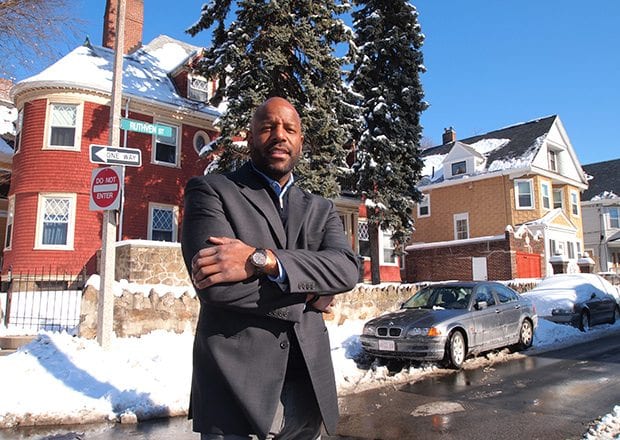
Roxbury’s real estate market is booming, according to brokers who sell listings in the Boston neighborhood. But entrenched perceptions that Roxbury is a black neighborhood and lingering concerns that Roxbury is dangerous conspire to suppress home values.
For real estate broker Kobe Evans, the negative perceptions of the neighborhood surface when sellers list the address of Roxbury properties as Jamaica Plain or the South End, more desirable areas.
“Even on Williams Street in Dudley, people will say this is the South End,” Evans said.
The shifting of Roxbury’s boundaries to demarcate race lines and dictate real estate values is not new. Neighborhood boundaries began shifting when the black community moved from Beacon Hill to Roxbury in the early decades of the 20th century.
Despite changing demographics that have seen Roxbury’s black population drop to 51 percent, some whites are still reticent to buy or rent in the neighborhood.
Residents of Roxbury, Jamaica Plain and the South End attend the same schools and ride the same public transit system. But real estate values in Roxbury are considerably lower than those in its surrounding neighborhoods.
In many cases, the perceptions of Roxbury as a dangerous neighborhood are rooted in the way crime is reported.
In the 1980s and ‘90s, when former Banner Managing Editor Robin Washington worked in Boston, for a variety of news outlets, Roxbury was often a code word for black.
“I can’t tell you how many broadcast reports began with ‘a Roxbury man,’” he says, noting that often, the subjects of stories on crime were actually residents of Dorchester, the South End or Jamaica Plain. “You never heard them say, ‘a South Boston man.’ You can’t get into anybody’s head, but I think it was an easy shorthand that writers or reporters could latch onto.”
Stick-ups and house break-ins are a common occurrence in the South End, where low-income housing developments abut million dollar condos whose well-heeled residents are more likely to carry cash and high-end jewelry than the average Roxbury resident. Nonetheless, the South End remains a preferred area.
Yet Roxbury housing values trail far behind surrounding neighborhoods. While the median sales price in Roxbury’s 02119 zip code was $221,000 between Oct. 13 of last year and Jan. 14, in Jamaica Plain it was nearly twice that at $440,000. In the South End/Lower Roxbury zip code 02118, the average sales price was $660,000. And in Dorchester’s 02124 zip code, which runs from Bowdoin Street to Lower Mills, the median sales price was $335,000.
The stigmatization of Roxbury is tied to historically negative perceptions of blacks, according to state Rep. Byron Rushing, president of the Roxbury Historical Society.
“The over-arching issue has been race,” he says. “The name Roxbury became associated with the black community. Whites who were living in different parts of Roxbury began using other names for where they lived.”
Whites living in the Parker Hill section of Roxbury began identifying their neighborhood as Mission Hill, dropping the name Roxbury. Sections of Roxbury were lost to Jamaica Plain at this time as well. And the line between Roxbury and Dorchester moved east.
White flight from black areas was not unique to Boston. But the plasticity of Boston’s neighborhood lines allowed whites to essentially secede from Roxbury.
Despite the historically negative perceptions of the neighborhood, Evans is having little trouble selling homes in Roxbury.
“There’s not a lot of inventory, but there’s high demand,” he says. “People are coming over from Brigham Circle and the South End. People gravitate here because of the location and because the price point is lower.”
Much of Evans’ clientele is African American, but whites are buying as well.
“I’ve sold a lot of properties to younger white women who have lived in Jamaica Plain,” he says. “There’s not much concern over the safety of the neighborhood if they feel the price is right.”
While white buyers zeroed in on Fort Hill in recent years, whites are now buying everywhere in the neighborhood.
And, according to Rushing, people living in Roxbury’s neighborhoods are now more likely to claim Roxbury.
“Compared to the ‘40s and the ‘50s, the image of Roxbury has improved a lot,” says Rushing. “People don’t argue with you any more when you say their neighborhood is part of Roxbury.”







